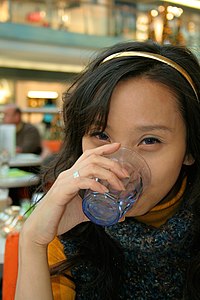
Photo from wikipedia
Several public health departments throughout North America have responded to the obesity epidemic by mandating that restaurants publish calories at the point of purchase—with the intention of encouraging healthier food… Click to show full abstract
Several public health departments throughout North America have responded to the obesity epidemic by mandating that restaurants publish calories at the point of purchase—with the intention of encouraging healthier food decisions. To help determine whether accompanying calorie information successfully changes a food’s appetitive value, this study investigated the influence of calorie information on brain responses to food images. During functional magnetic resonance imaging (fMRI) scanning, dieting (N = 22) and non-dieting (N = 20) participants viewed pictures of food with and without calorie information and rated their desire to eat the food. When food images were paired with calorie information, not only did self-reported desire to eat the food decrease, but reward system activation (Neurosynth-defined from the term “food”) decreased and control system activation (the fronto-parietal [FP] control system) increased. Additionally, a parametric modulation of reward activation by food preferences was attenuated in the context of calorie information. Finally, whole brain multivariate pattern analysis (MVPA) revealed patterns of activation in a region of the reward system—the orbitofrontal cortex (OFC)—that were more similar for food images presented with and without calorie information in dieting than non-dieting participants, suggesting that dieters may spontaneously consider calorie information when viewing food. Taken together, these results suggest that calorie information may alter brain responses to food cues by simultaneously reducing reward system activation and increasing control system activation. Moreover, individuals with greater experience or stronger motivations to consider calorie information (i.e., dieters) may more naturally do so, as evidenced by a greater degree of representational similarity between food images with and without calorie information. Combining an awareness of calories with the motivation to control them may more effectively elicit diet-related behavior change.
Journal Title: PLoS ONE
Year Published: 2018
Link to full text (if available)
Share on Social Media: Sign Up to like & get
recommendations!